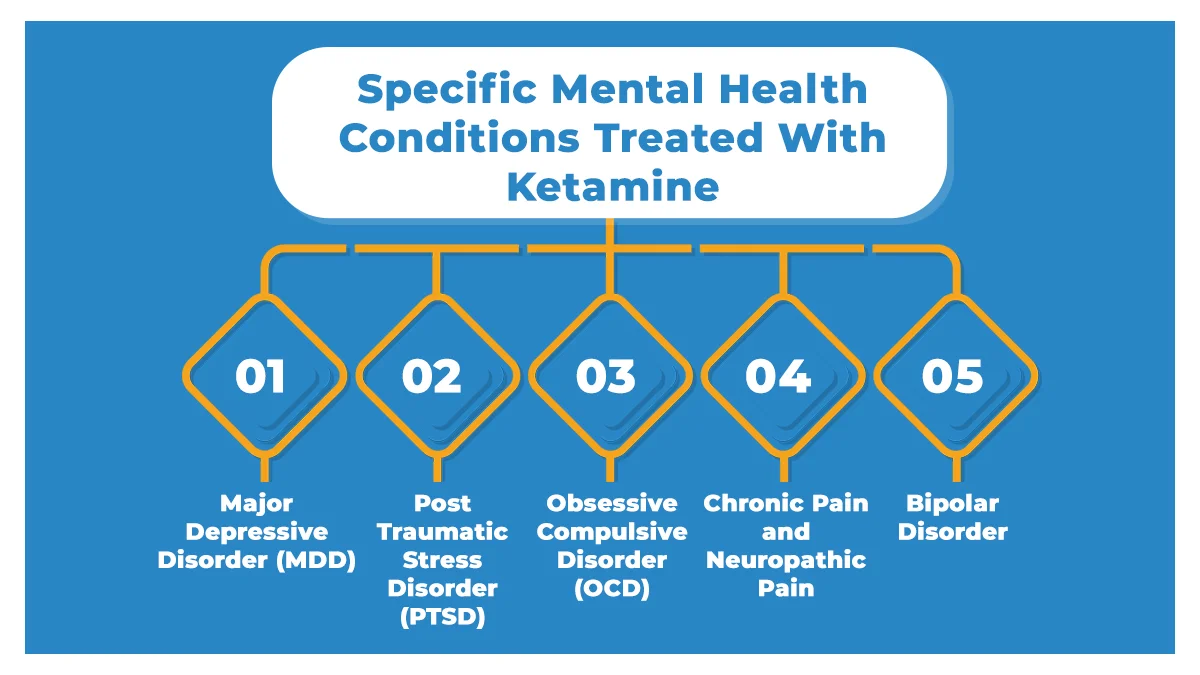
Does Insurance Cover Suboxone Treatment Costs
Explore the basics of insurance coverage for suboxone treatment in this guide from The Recovery Team-Newton.

Ketamine, traditionally known as an anesthetic and party drug, has emerged as a groundbreaking intervention in mental health. Beyond its traditional application in surgery, ketamine has gained prominence for its rapid and transformative effects on various mental health conditions.
From depression and anxiety to PTSD, Ketamine has shown rapid and profound therapeutic effects, often when other treatments have failed.
This innovative approach has opened new avenues in mental health care, offering hope to those navigating the complexities of psychiatric disorders.
Despite ketamine’s therapeutic potential, misuse poses risks, contributing to its classification as a controlled substance. Here’s what you need to know:
Contact The Recovery Team-Newton at (508) 978-2772 for more information and recovery assistance for long-term wellness.
Ketamine is a dissociative anesthetic that induces a trance-like state, providing pain relief, sedation, and amnesia. Initially developed for human and veterinary anesthesia, it’s now recognized for its off-label use in managing depression, chronic pain, and post-traumatic stress disorder.
Operating on the NMDA receptor, ketamine modulates glutamate, impacting mood and cognition. Unlike traditional antidepressants, its rapid onset has led to breakthrough treatments, particularly in cases resistant to standard therapies.
Ketamine, traditionally known as an anesthetic and analgesic medication, has gained attention in recent years for its potential therapeutic effects on certain mental health conditions, particularly treatment-resistant depression.
Here are some specific mental health conditions that have been explored in ketamine treatment:
Ketamine has shown promise in the treatment of severe and treatment-resistant depression. It is often administered in a controlled setting, and its rapid antidepressant effects can be observed within hours to days after a single infusion.
Some studies have suggested that ketamine may have a role in managing the depressive phase of bipolar disorder. However, its use in bipolar disorder is still an area of ongoing research, and caution is warranted due to the potential for manic episodes.
Ketamine has been investigated as a potential treatment for PTSD, particularly in cases where traditional treatments have not been effective. Research is ongoing to determine its efficacy and safety in this context.
Preliminary studies have explored the use of ketamine in treating OCD symptoms. However, more research is needed to establish its effectiveness and safety in the long term.
Ketamine has analgesic properties and has been used in the management of chronic pain conditions, including neuropathic pain. Its role in pain management is separate from its use in psychiatric conditions.
Ketamine is administered through different methods, and the dosage and duration of treatment can vary based on the individual’s response and the specific mental health condition being addressed.
The duration and dosage of ketamine treatment can vary depending on the condition being treated, the specific protocol used, and the healthcare provider’s judgment.
Below are some general guidelines to follow:
It’s important to note that the specifics of ketamine treatment, including dosage and duration, should be determined by a qualified healthcare professional based on the individual patient’s needs and response to the treatment. Regular monitoring and assessment are crucial to ensuring the safety and efficacy of ketamine therapy for mental health conditions.
Ketamine has been used for various purposes, including anesthesia and pain management. In recent years, there has been growing interest in the use of ketamine for the treatment of certain mental health conditions.
Here are some potential advantages of ketamine treatment:
Ketamine is known for its rapid onset of action, often providing relief within hours or even minutes, compared to traditional antidepressant medications that may take weeks to show effects. This can particularly benefit individuals in acute distress or those not responding well to other treatments.
Ketamine has shown promise in treating individuals with treatment-resistant depression, meaning those who have not responded well to conventional antidepressant medications. It may offer an alternative for individuals who have struggled with other treatment options.
Some studies suggest that ketamine may have a rapid and significant impact on reducing suicidal thoughts in individuals with depression. This can be crucial for those at immediate risk of self-harm.
Ketamine is believed to influence neuroplasticity, the brain’s ability to reorganize and form new neural connections. This property may contribute to its antidepressant effects by promoting positive changes in the brain.
Ketamine’s mechanisms of action are different from those of traditional antidepressants, and it may have a lower risk of drug interactions with other medications. This can be advantageous for individuals who are taking multiple medications.
Ketamine treatments are often administered in an outpatient setting, and the patient can return home shortly after the treatment. This can be more convenient for individuals compared to some other treatment modalities that may require inpatient stays.
The effects of ketamine treatment can vary among individuals, and healthcare providers may have the opportunity to tailor the treatment based on a person’s specific response. This potential for personalized medicine is an area of ongoing research.
Ketamine has both short-term and long-term effects, and its use should be carefully monitored and administered by qualified medical professionals.
Here are some of the short-term and long-term side effects associated with ketamine use:
It’s important to remember that ketamine has therapeutic uses, such as in anesthesia and the treatment of certain psychiatric conditions. However, recreational or non-medical use of ketamine poses significant risks, and any use should be under the guidance of a qualified healthcare professional.
Additionally, individual responses to ketamine can vary, and the impact of short-term and long-term use may differ from person to person.
Start your journey towards mental wellness with The Recovery Team-Newton.
Our dedicated team is committed to helping you overcome mental health struggles through personalized care. Experience the transformative power of our day treatment program, providing structured therapeutic support to get rid of mental health problems.
Uncover the healing potential of our medication-assisted treatment, combining medication with counseling for a holistic approach to mental well-being. Moreover, our dual diagnosis treatment addresses both mental health and substance use disorders, fostering lasting growth and recovery.
Ketamine, administered in clinical settings under a psychiatrist’s supervision, shows promise in treating mental health disorders. However, recreational use poses risks due to psychedelic effects, potential for addiction, and adverse reactions.
The FDA approves ketamine for medical use, but unsupervised consumption may have detrimental effects on both mental and physical health. Consultation with doctors in ketamine clinics is crucial for safe and effective treatment.
Ketamine-assisted psychotherapy involves administering the anesthetic ketamine in a therapeutic setting to enhance traditional psychotherapy. Its dissociative effects may help individuals explore emotions and memories.
This emerging approach shows promise in treating mental illnesses, including major depression, social anxiety disorder, and trauma, though further research is needed to understand its efficacy and safety fully.
Ketamine infusion therapy involves administering low doses of ketamine intravenously to treat mood disorders such as severe depression and anxiety. The rapid effects of ketamine products may provide relief for individuals who have not responded to traditional treatments.
Researchers reported its potential in resetting neural pathways, but long-term effects and safety require further investigation.

Explore the basics of insurance coverage for suboxone treatment in this guide from The Recovery Team-Newton.

Explore the effectiveness of medication-assisted treatment with The Recovery Team-Newton.

Explore the examples of dual diagnosis and its treatment plans for better outcomes with The Recovery Team-Newton.